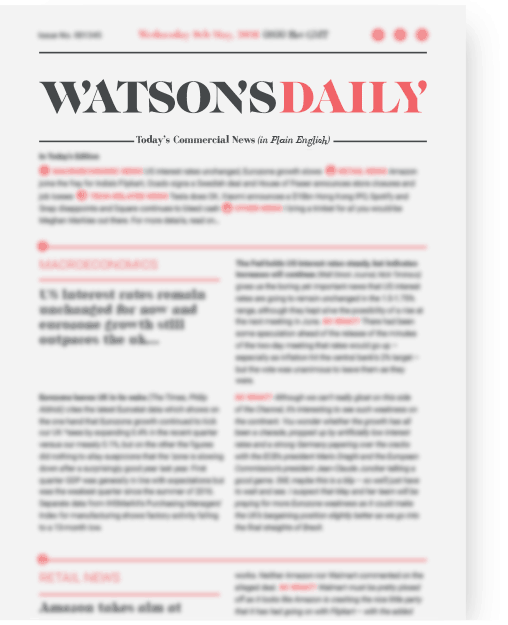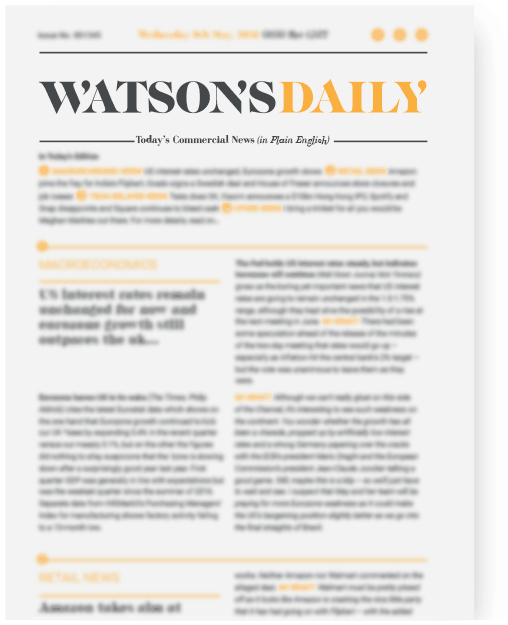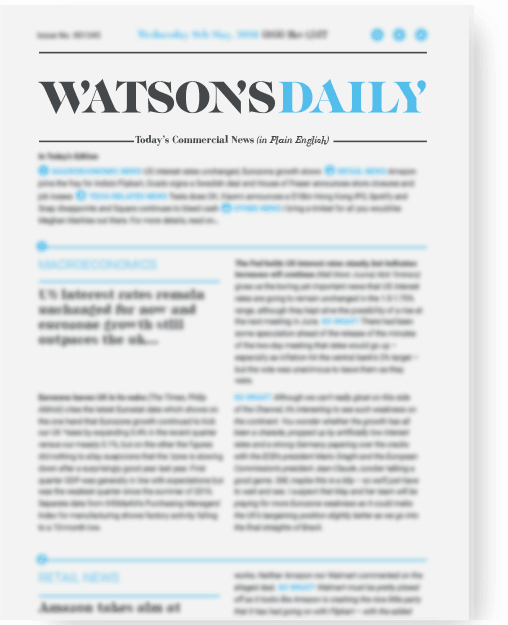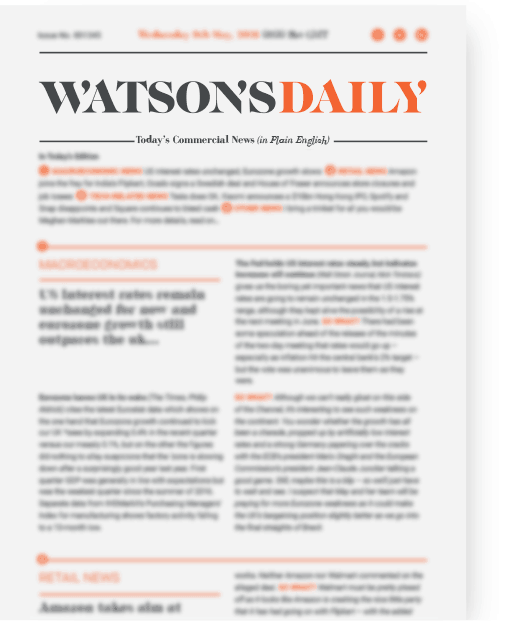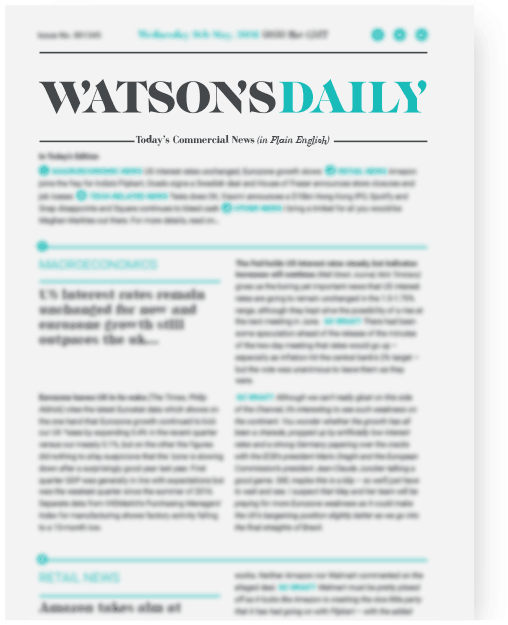- In MACRO NEWS, Brexit takes another turn but the UK economy rebounds
- In CAR NEWS, VW targets electric, Nissan’s Infiniti production stops in the UK and Pendragon focuses on secondhand
- In HIGH STREET NEWS, Mothercare sells its toy business, French Connection is a mixed bag and Dick’s Sporting Goods stops selling guns in 125 stores
- In OTHER NEWS, I bring you a birthday idea and Pigcasso. For more details, read on…
1
MACRO NEWS
So the Brexit drama continues while the UK economy has a bit of a rebound…
Power over Brexit slips from May’s damaged hands (Financial Times, George Parker, Jim Packard and Alex Barker) highlights May’s latest Commons defeat as her slightly reworked Brexit was rejected by a big margin yesterday evening by MPs. There will now be a Commons vote today to block a no-deal exit on March 29th followed by a second vote tomorrow that would let MPs get an extension to the formal Article 50 process from the EU. * SO WHAT? * It would seem that we are no further along than we were before as the current deal is scuppered, we face an extension that could cost us money and still get us nowhere and the prospect of no-deal is still on the table. Some argue that taking a no-deal option off the table would remove one of the last bargaining chips we have with the EU, Labour is desperate for an election (which I believe will just make things worse and merely serve to kick the can down the road) and more MPs are calling for Theresa May’s head (but again, what’s that actually going to do?). There’s
still the possibility of a “People’s Vote” (which is a term, by the way, that I find annoying – it was the “people” who voted for Brexit in the first place! 75% of MPs in the House of Commons voted for Remain!) but I don’t know at the moment the mechanics of how that would come about. The drama/farce continues…
UK economy rebounds in January despite Brexit uncertainty (The Guardian, Richard Partington) is a headline that runs somewhat at odds with everything else that’s going on at the moment, but data from the Office for National Statistics shows that monthly GDP actually grew by 0.5% in January – the biggest jump since December 2016! This appeared to be down to stronger performances from the services, production, manufacturing and construction sectors following a weak ending to 2018 when they all fell. * SO WHAT? * Although January’s stats are good news, it is worth noting that monthly data can be rather volatile and Suren Thiru, head of economics at the British Chambers of Commerce, observed that “The data for the longer three-month period recorded an economy that was continuing to slow under the weight of uncertainty over Brexit and weakening global trading conditions”. Clarity on Brexit will be needed to get Britain out of the rut it is currently in – and this is something that a deadline extension will not help.
2
CAR NEWS
VW targets electric, Nissan halts Infiniti production in the UK and Pendragon focuses on secondhand…
Volkswagen sets bold targets as it steps up electric ambitions (Financial Times, Peter Campbell) highlights VW’s renewed commitment to making electric vehicles (EVs) as the company outlined some concrete targets for battery car sales and promising to cut carbon emissions. This sounds like great news for the environment (targeting 70 fully electric models by 2028 – up from an earlier target of 50 by 2025 – and 40% of group sales by 2030 to be battery-powered versus an earlier estimate of 25% by 2025) but not so good for employees, whose numbers will be cut according to chief exec Herbert Diess at VW’s annual press conference yesterday. The company also outlined a goal to be completely carbon-neutral by 2050 including its factories, offices and cars and will adopt shorter-term measures like moving plants to using renewable energy and “trying” to reduce executive use of private jets (!). * SO WHAT? * This all sounds rather lovely, but the fact is that these are just wishes. They’re close enough to sound sort of within reach but far enough away to tweak according to the whim of whoever’s in charge at the time. Shareholders will be more concerned about what the company is going to do about falling margins at marques like Audi, Porsche and Bentley and near-term strategies for an environment where sales are generally falling.
Just when you thought that British car manufacturing was nursing its wounds in a dark alley having been given a right kicking from Honda, Nissan halts production of Infiniti vehicles at Sunderland (Daily Telegraph, Alan Tovey)
shows another Japanese company sticking the boot in. Nissan has decided to stop production this summer of the Q30 hatchback and QX30 crossover at the giant Sunderland plant as sales in Europe have been poor. Nissan’s premium marque added that the decision would be part of a broader restructure “in anticipation of a planned withdrawal from western Europe in 2020”. Infiniti said that it will focus its efforts on the growing markets of America and China. * SO WHAT? * A nightmare for car manufacturing in the UK. Jaguar Land Rover announced in January that it would cut 10% of its workforce (about 4,500 jobs), Nissan’s withdrawal from Swindon will put 3,000 jobs on the line and although Infiniti will “only” shed/redeploy 200 employees who were working on Infiniti out of 7,000 staff at the Sunderland plant, EVERYONE is going to be pretty nervous. The uncertainty of Brexit is obviously a factor, but the overall downward trend in car sales is affecting all manufacturers. If I was working in a car factory right now I’d be trying to retrain and get skills that I could use to apply to other jobs.
Talking of falling sales, Pendragon focuses on used-car market as new car sales slide (Daily Telegraph, Alan Tovey) shows that UK new car registrations were down by 6.8% last year as customers became increasingly wary of making a big ticket purchase ahead of Brexit. Pendragon is one of the UK’s biggest car dealers with almost 200 outlets and its chief exec, Trevor Finn, said that the company is focusing more on the secondhand market – which is triple the size of the new car market – because it offered a “more stable and reliable supply chain”. * SO WHAT? * This sounds like a decent-enough move as punters still want cars – but they are getting less enamoured by the new car smell and more conscious of the depreciation of a new car as it rolls off the forecourt. Pendragon wants to double its sales of used cars by 2021 and part of that effort has involved the company developing its online sales.
3
HIGH STREET NEWS
Mothercare sells off Early Learning Centre, French connection sees revenues fall but profits rise and Dick’s Sporting Goods cuts its sale of guns…
Mothercare sells Early Learning Centre to rival in £13.5m deal (The Guardian, Zoe Wood) highlights the sale of ELC to competitor chain The Entertainer. Back in the day, ELC had over 200 UK stores but time has not been kind and the brand is currently sold in Mothercare outlets as well as other chains. The Mothercare chief exec, Mark Newton-Jones, sounded somewhat wistful when he said “It is a brilliant brand and we simply don’t have the resources to nurture it” but Mothercare is still scrabbling around to survive and will use the £13.5m proceeds from the sale to reduce its £21.5m of bank debt, which is hoping to clear by the end of this year. It will also give The Entertainer control over the running of its toy departments. * SO WHAT? * This was a tough but necessary part of Mothercare’s efforts to survive as it follows a cull of 40% of its branches against the backdrop of ongoing competition from online retailers and increasingly thrifty customers. The Entertainer, on the other hand, has bought a business for a steal. Gary Grant, founder and exec chairman of The Entertainer said that he would review the business in the first instance and then think about reintroducing it to the high street.
Black is in fashion as retailer makes profit (The Times, Deirdre Hipwell) shows that French Connection managed to make its first profit in seven years, but sales have continued to fall in the UK in difficult trading conditions. * SO WHAT? * This announcement came as founder and chief exec Stephen Marks continues to try to offload his 42% stake in the business. Oh how times have changed since the company’s heyday in the 90s with its naughty FCUK logo as it has long since been overtaken by the likes of Zara and H&M. Well done in turning a profit, but it’s going to take a brave company to buy a fashion chain that has lost its way in these current economic circumstances. FWIW, I think it still has intrinsic value and is long overdue a major overhaul.
Although I assume that most readers of Watson’s Daily don’t normally have the urge to go and buy a gun, Dick’s Sporting Goods to remove guns from 125 stores (Wall Street Journal, Sarah Nassauer) says that the American sporting goods retailer will stop selling firearms at 125 of its outlets. It will use the space to sell higher-margin products such as licensed sports gear and outdoor recreation equipment after the company decided last year to tighten up its policies on gun sales. Would-be massacre merchants will be dismayed to hear that the decision was hastened due to falling sales after the company stopped selling to those under 21 and curtailed the sale assault-style weapons (!). Although stock in the company fell by 9% in trading yesterday, its share price has risen by 25% since the start of the year.
4
OTHER NEWS
And finally, in other news…
Today, I thought I’d bring you an original birthday idea in Sons wish dad happy birthday with huge billboard (Inside Edition, https://tinyurl.com/y2ehxpj4) and a very talented pig in Painting sow Pigcasso hogs the limelight at South Africa farm (Reuters, Alexandra Hudson https://tinyurl.com/yy8pg4ha).
Some of today’s market, commodity & currency moves (as at 0821hrs green is up, red is down). THIS IS INTENDED AS A ROUGH GUIDE ONLY!
| FTSE 100 * | Dow Jones * | S&P 500 * | Nasdaq * | DAX * | CAC-40 * | Nikkei ** | Shanghai ** |
| 7,151 (+0.29%) | 25,555 (-0.38%) | 2,792 (+0.30%) | 7,591 | 11,524 (-0.17%) | 5,270 (+0.08%) | 21,290 (-0.99%) | 3,025 (-1.17%) |
| Oil (WTI) p/b | Oil (Brent) p/b | Gold Per t/oz | £/$ | €/$ | $/¥ | £/€ | $/₿ |
| $57.2549 | $66.7387 | 1,303.42 | 1.31359 | 1.12877 | 111.36 | 1.16369 | 3,856.88 |
(markets with an * are at yesterday’s close, ** are at today’s close)





